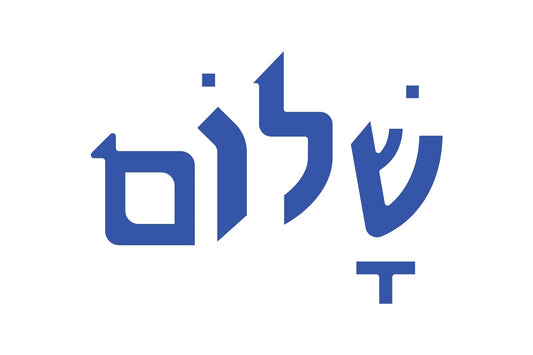
The Flavors of Israel
The Flavors of Israel: A Culinary Journey Through Israeli Food and Culture
Israeli food is a vibrant and eclectic blend of flavors, ingredients, and traditions. Drawing from the diverse backgrounds of its people, Israel’s cuisine brings together influences from Europe, North Africa, the Middle East, and beyond. Much like Israeli slang, which borrows words from a variety of languages, Israeli food is a true reflection of the multicultural fabric of the country.
Whether you’re savoring street food in Tel Aviv, enjoying a family meal for Shabbat, or experiencing a bustling shuk (market), Israeli cuisine offers something for everyone. Let’s take a look at the culinary traditions that define Jewish culture in Israel and how they intertwine with everyday life.
The Roots of Israeli Cuisine
The origins of Israeli food are as diverse as the country itself. After the founding of Israel in 1948, Jewish immigrants from all over the world brought with them their unique culinary traditions. Ashkenazi Jews from Eastern Europe introduced dishes like gefilte fish and kugel, while Sephardic Jews from North Africa and the Middle East contributed to Israel’s rich array of spices, grains, and flavors. Over time, these different influences blended into the modern Israeli cuisine we know today.
Israel’s Mediterranean climate has also played a role in shaping its food culture. Fresh vegetables, olive oil, herbs, and fruits are staples in Israeli kitchens, with dishes often emphasizing healthy, natural ingredients.
Iconic Israeli Dishes
While Israeli cuisine offers a wide variety of foods, there are several iconic dishes that have become synonymous with Jewish culture and life in Israel.
-
Falafel: Arguably Israel’s most famous street food, falafel consists of deep-fried chickpea balls served in pita bread with a variety of toppings, including salad, pickles, tahini, and amba (a tangy mango sauce). You’ll hear Israelis use the phrase "sababa" (cool) when biting into a perfect falafel wrap!
-
Hummus: A staple in any Israeli meal, hummus is a creamy dip made from blended chickpeas, tahini, garlic, and lemon. It’s often served with warm pita bread or eaten as part of a mezze platter. Some even argue over who makes the best hummus in Israel—it’s a source of pride and friendly competition!
-
Shakshuka: This dish, made of poached eggs in a spicy tomato sauce, has become a breakfast favorite in Israel. Originally from North Africa, shakshuka is now a popular choice in homes and cafes throughout the country.
-
Sabich: A pita sandwich filled with fried eggplant, hard-boiled eggs, hummus, and an assortment of salads and sauces. It’s a dish that was brought to Israel by Iraqi Jews and has since become a beloved street food.
-
Jachnun: A slow-cooked Yemenite pastry served with crushed tomatoes and hard-boiled eggs. It’s traditionally eaten on Shabbat mornings and is a comforting dish that reflects the influence of Yemenite Jews on Israeli cuisine.
The Role of Food in Israeli Culture
Food in Israel is more than just a way to satisfy hunger—it’s a key part of Jewish culture and social life. Family gatherings around the dinner table, particularly on Shabbat and holidays, are central to Israeli life. These meals often feature a variety of traditional foods that have been passed down through generations.
In the streets, food markets like the Carmel Market in Tel Aviv or the Machane Yehuda Market in Jerusalem showcase the richness of Israeli ingredients and culinary traditions. Walking through these markets, you’ll hear a mix of Israeli slang as vendors call out to potential buyers, offering everything from fresh produce to spices and baked goods. The experience is a sensory overload of sights, sounds, and smells, with vibrant colors and lively conversations.
Israeli Art and Food: A Cultural Connection
Much like Israeli food, Israeli art is a reflection of the country’s diverse heritage. Artists in Israel often draw inspiration from their surroundings, with food playing a key role in their creations. From paintings that capture the beauty of a bustling market to street art that celebrates Israel’s culinary traditions, food and art are deeply connected in Israeli culture.
At Oytiot, we love celebrating this blend of Israeli art and culture through our unique designs. Our products, including Jewish shirts and Hebrew shirts, highlight the vibrancy of Israeli life—whether it’s through slang words, meaningful Hebrew phrases, or artistic representations of Israeli landmarks and traditions.
Embracing Israeli Culture Through Food and Fashion
If you’re looking for ways to embrace Jewish culture beyond the dinner table, consider exploring our collection of Jewish shirts and Hebrew shirts at Oytiot. We bring the spirit of Israel’s rich traditions to life through our designs, offering a unique way to connect with Israeli culture wherever you are.
Our shirts are designed in Israel, featuring iconic Hebrew phrases, Israeli slang, and art that reflects the beauty of Israeli life. Whether you’re wearing a shirt with the word “sababa” (cool) or showcasing a design inspired by Israeli food and culture, our products help you carry a piece of Israel with you wherever you go.
A Taste of Israel
Whether you're exploring the lively markets of Tel Aviv or enjoying a family meal at home, Israeli food offers a taste of the country’s rich heritage. And just like food is a way to bring people together, so too is fashion. At Oytiot, we celebrate Israel’s unique blend of flavors, culture, and history through our collection of Jewish shirts and Hebrew shirts. Perfect for yourself or as Jewish gifts for loved ones, our designs are a stylish way to honor and celebrate the traditions of Israel.







